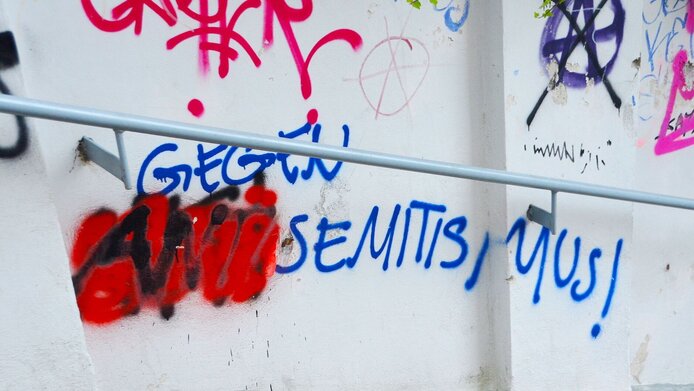The milieu of the "Ehemaligen" in Austria

“Although the Shoah marked a decisive turning point in many respects, Nazi attitudes and anti-Semitism did not disappear from the scene after 1945, but continued to exist in various forms and areas”, says Margit Reiter in the interview with scilog. In a research project running until the end of 2018, the historian from the University of Vienna has been investigating how former supporters of the Nazi regime positioned themselves politically in the post-war era, between 1945 and 1960, and how they pursued their ideologies. In her FWF-funded project, the researcher has performed the first systematic investigation of the milieu of former Nazis (sometimes referred to as the Ehemaligen in German). Margit Reiter has also succeeded in tapping into new sources, such as the estate of the first party chairman of the FPÖ, Anton Reinthaller, who was a major player in this context.
Reinthaller's estate and many other sources, including Nazi documents, denazification files and material on the Glasenbach internment camp, memoirs of former Nazis, parliamentary minutes and party files, helped Reiter to produce a precise reconstruction of the social environment in which these people moved. She found networks of personal contacts that often date back to the 1930s and continued to exist after 1945. During his time as an illegal National Socialist, Reinthaller also maintained contacts with the Christian Socialists, which turned out to be helpful to him after 1945. In 1938, his Nazi career took off with a ministerial appointment. While Reinthaller was prosecuted by a Volksgericht (“People’s Court” tribunal) in 1950, he was pardoned in 1953 and resumed his political activities. “After undergoing the denazification process, the steadfast ‘Ehemaligen’ were once again free to act as they saw fit,” says Reiter. They turned away from a predecessor party, the Verein der Unabhängigen (VdU), which had been founded in 1949, and, in 1956, established the FPÖ (Freedom Party of Austria) under the motto "faithful, loyal, ready for sacrifice".
Regrouping among the Ehemaligen
Reiter does not seek merely to record the history of this political party. She is interested in the question of how particularly inveterate Nazis created new political arenas, analysing who was accepted as a member in the VdU and the FPÖ and who was not. “The nationalist camp was by no means homogeneous; stances differed and there was a great deal of in-fighting. The boundaries between ‘liberal’ and ‘nationalist’ were not altogether clear-cut”, the historian explains. She came to the conclusion that ultimately the question at the time was not so much whether someone’s opinions were too extreme, but what counted were strategic considerations about who would boost the image of the party and who would be detrimental to it.
Anti-Semitism not a marginal phenomenon
By 1957, if not earlier, denazification policies had been reversed and many former Nazis were granted compensation and rehabilitation. “They managed to achieve everything that was granted to the Jews only in part or not at all”, Reiter reports. Anti-Semitism continued to thrive and had a noticeable presence in public discourse. This included unfettered anti-Semitism expressed by people in their own close circles but also new forms, such as denial of guilt (reversal of victim and perpetrator) and all possible attempts at counter-accusation. Later on, anti-Semitic attitudes were expressed mainly indirectly, cloaked in well-understood code phrases such as "the emigrants", "East Coast" or "neo-Americans". A practice that has continued to this day and is currently gaining new momentum, “as in the case of the right-wing campaign against the Hungarian-American investor George Soros”, notes Reiter. "Not to make too fine a point about it: there was a learning curve, people learnt what they could get away with saying and what they couldn’t.”
Ideological continuities
The principal investigator of this FWF project also suggests that one of the reasons why the Austrian relationship to National Socialism was never comprehensively processed was that, unlike Germany, post-war Austria lacked a strong political directive from above. Even then, the party-political manoeuvring of the two major parties, the SPÖ and the ÖVP, dominated the scene. Each of them hoped that a fourth party would weaken the other camp. This is also why there has never been a clear-cut break with the Nazi past in Austria.
On the contrary, there was a wide overlap between the official and the societal position on National Socialism. “That's also the reason, I think, why it worked so well”, says the historian from the University of Vienna. The reappraisal of the National Socialist past in the Austrian context is central to Margit Reiter's understanding of a dark chapter of history that continues to make an impact on the country to the present day. In her next venture, the scientist intends to focus on the transnational networks of former Nazis in Europe. “Relationships and contacts from that time have often survived across generations.”
Personal details
Margit Reiter works as a lecturer and research fellow at the Institute for Contemporary History at the University of Vienna. She was a Fellow at the Center for Holocaust Studies in Munich in 2016. Her research focuses on anti-Semitism and anti-Americanism, National Socialism and NS post-history as well as on the history of memory. In 2019, the Wallstein Verlag will publish a monograph on her project about “the Ehemaligen after 1945”.





